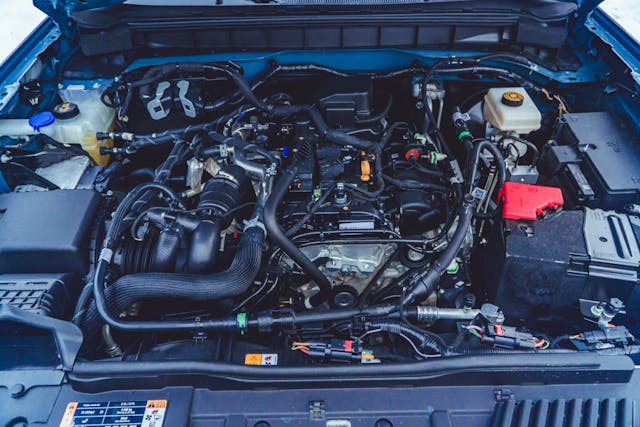NHTSA to boost investigation into “catastrophic” failure in Ford V-6 engines
The National Highway Traffic Safety Administration (NHTSA) said on Monday it was expanding its investigation into Ford SUVS and pickups over possible “catastrophic” engine failures caused by the fracturing of engine intake valves.
Affected are the 2021 Ford Bronco (25,619 vehicles), as well as additional Ford “populations” equipped with the 2.7-liter EcoBoost engine including the 2022 Bronco (33,106 vehicles), 2021–2022 F-150 (155,619 vehicles), 2021–2022 Edge (6889 vehicles), and 2021–2022 Lincoln Nautilus (8596 vehicles).
Said NHTSA’s investigation: “Under normal driving conditions without warning the vehicle may experience a loss of motive power without restart due to catastrophic engine failure related to an alleged faulty valve within 2.7 L and 3.0 L EcoBoost engines.” NHTSA will add the 2021–22 Ford Explorer and Lincoln Aviator with the 3.0-liter engine to the investigation.

The investigation began with owner complaints over the 2021 Ford Bronco 2.7-liter engine, but has expanded to other 2021/2022 vehicles and the 3.0-liter engine, which is from the same engine family.
“During the investigation,” NHTSA said, “multiple contributing factors were identified which can lead to the fracturing of the intake valves in the subject engines. Ford acknowledged that a fractured intake valve can result in catastrophic engine failure and a loss of motive power and noted that following a valve fracture, a vehicle typically requires a full engine replacement.

“Ford advised that the defective valves were manufactured out of a specific alloy known as ‘Silchrome Lite’, which can become excessively hard and brittle if an over-temperature condition occurs during machining of the component.
“A design modification was implemented in October 2021, which changed the intake valve material to a different alloy known as ‘Silchrome 1’ that is less susceptible to over-temperature during machine grinding. Ford has identified that the defective intake valves commonly fail early in a vehicle’s life and has suggested that the majority of failures have already occurred.”
The investigation will precede a decision by NHTSA and Ford to decide whether a recall is warranted.
***
Check out the Hagerty Media homepage so you don’t miss a single story, or better yet, bookmark it. To get our best stories delivered right to your inbox, subscribe to our newsletters.



At one time “Quality WAS Job One”
That was always advertising rhetoric.
@Paul- It actually worked for a few years when Ford listened to Dr.Deming and followed his advice- “As stated by ASQ‘S Journal of Record, February 1994 (after the passing of Dr. Deming) – “Ford Motor Company was one of the first large American corporations to seek Deming’s help. Deming questioned the company’s culture and told Ford executives that 85% of quality problems are the result of management errors. Under Deming’s guidance, Ford led the U. S. auto industry in quality improvement during the 1980s. ”
I believe he also walked out of his first meeting with Ford executives when he realized the CEO was not present.
Quality is Job #2 as in poo.
To be fair, these valves are made by a supplier. It appears that they were spec’d properly for the intended use and the defect lies in the manufacturing process. Considering that many engines manufactured during that time period are running fine, this suggests that the over-temp situation may have occurred only on a subset of the manufacturing equipment, perhaps even just one machine. I’m not sure how one would be able to prevent this short of imagining the scenario and using “Silchrome Lite” in the initial design.
Are these valves friction-welded two-piece valves like engines of the ’70s ? Because those things failed regularly if you took the engine up the rpm scale.
Chinese supplier?
Moved to Ram and then GMC for pickups – Ford lost its way on quality
Ford’s EcoBurst motors scare me. I’ll take a pass on them. Ford and Hyundai/Kia are leading the way in engine recalls.
Is it specifically EcoBoost that scares you, or any turbocharged motor?
EcoBoost reliability scares me. I own or have owned Toyota, Subaru and Mitsubishi turbocharged motors over the last 26 years without incident. I currently have a 26 year old turbocharged car that has run with zero incidents but have friends who have experienced the EcoBurst failure on their 3.5L motors. Ford seems to have a history of cutting corners.
I have two full size Ford vans with EcoBoost motors . junk ! Replaced one motor completely and numerous turbos
And how many customers got stuck with the bill?
It reminds me of the coolant leaking issues on the 4.6 motors on my brother’s 98 Mustang GT. They quietly fixed the issue on the later years by changing from a plastic to a metal intake manifold and said nothing about the defect as users like my brother hopefully came in after the warranty expired. The plastic cracked because the alternator mounted to it created lots of stress that the metal had no issues with. Yeah he had to pay for it.
Does this sounds familiar? The Ford Bronco 2 comes to mind, cracked aluminum heads and block. High tech at the time but junk on the long haul. Time will tell, I would not want to be the first to jump on the new Bronco bandwagon.
Man, that is one of the ugliest underhood looks I have ever seen. Keep the hood closed. Please.
Welcome to modern engine compartments. I don’t know of a single good looking engine today. Perhaps there’s the odd nice looking plastic engine cover or two, but that’s about it. Sigh.
I worked for Ford as a salesman for 12 years, and am glad to be done with their the Eco-Boost program. The 1.5, 1.6 and 2.0 all had head gasket/water leak problems. The 3.5, both turbo and N/A engines had timing chain issues. Even the 5.0 in pickups had problems now and again while the Gen3 5.0 greeted owners with piston slap during cols start ups. Sadly they stopped making their most reliable N/A engine in favor of the overworked turbos.
The EVs don’t have valves. Problem solved!